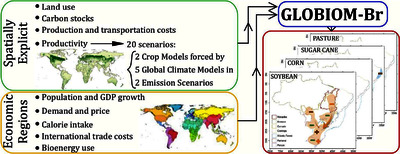Zilli, M., Scarabello, M., Soterroni, A., Valin, H.  ORCID: https://orcid.org/0000-0002-0618-773X, Mosnier, A., Leclere, D.
ORCID: https://orcid.org/0000-0002-0618-773X, Mosnier, A., Leclere, D.  ORCID: https://orcid.org/0000-0002-8658-1509, Havlik, P.
ORCID: https://orcid.org/0000-0002-8658-1509, Havlik, P.  ORCID: https://orcid.org/0000-0001-5551-5085, Kraxner, F., Lopes, M., & Ramos, F.
(2020).
The impact of climate change on Brazil's agriculture.
Science of the Total Environment 740 e139384. 10.1016/j.scitotenv.2020.139384.
ORCID: https://orcid.org/0000-0001-5551-5085, Kraxner, F., Lopes, M., & Ramos, F.
(2020).
The impact of climate change on Brazil's agriculture.
Science of the Total Environment 740 e139384. 10.1016/j.scitotenv.2020.139384.
Preview |
Text
STOTEN-D-20-00723_AuthorsVersion.pdf - Accepted Version Available under License Creative Commons Attribution Non-commercial No Derivatives. Download (1MB) | Preview |
Preview |
Text
SupplementaryMaterial.pdf - Supplemental Material Available under License Creative Commons Attribution Non-commercial No Derivatives. Download (3MB) | Preview |
![1-s2.0-S0048969720329016-ga1_lrg.jpg [thumbnail of 1-s2.0-S0048969720329016-ga1_lrg.jpg]](https://pure.iiasa.ac.at/16518/3.hassmallThumbnailVersion/1-s2.0-S0048969720329016-ga1_lrg.jpg)  Preview |
Image
1-s2.0-S0048969720329016-ga1_lrg.jpg - Graphical Abstract Available under License Creative Commons Attribution Non-commercial No Derivatives. Download (383kB) | Preview |
Abstract
Brazilian agricultural production provides a significant fraction of the food consumed globally, with the country among the top exporters of soybeans, sugar, and beef. However, current advances in Brazilian agriculture can be directly impacted by climate change and resulting biophysical effects. Here, we quantify these impacts until 2050 using GLOBIOM-Brazil, a global partial equilibrium model of the competition for land use between agriculture, forestry, and bioenergy that includes various refinements reflecting Brazil's specificities. For the first time, projections of future agricultural areas and production are based on future crop yields provided by two Global Gridded Crop Models (EPIC and LPJmL). The climate change forcing is included through changes in climatic variables projected by five Global Climate Models in two emission pathways (RCP2.6 and RCP8.5) participating in the ISIMIP initiative. This ensemble of twenty scenarios permits accessing the robustness of the results. When compared to the baseline scenario, GLOBIOM-Brazil scenarios suggest a decrease in soybeans and corn production, mainly in the Matopiba region in the Northern Cerrado, and southward displacement of agricultural production to near-subtropical and subtropical regions of the Cerrado and the Atlantic Forest biomes.
| Item Type: | Article |
|---|---|
| Uncontrolled Keywords: | GLOBIOM-Brazil; Land-use competition; Change in production; Soybean; Corn; Sugar cane |
| Research Programs: | Ecosystems Services and Management (ESM) |
| Depositing User: | Luke Kirwan |
| Date Deposited: | 18 Jun 2020 16:25 |
| Last Modified: | 12 Mar 2025 05:00 |
| URI: | https://pure.iiasa.ac.at/16518 |
Actions (login required)
 |
View Item |
 Tools
Tools Tools
Tools